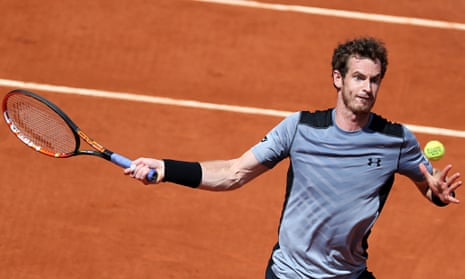Jérémy Chardy did probably not intend it to be this way but he has brought unexpected edge to his match against Andy Murray in the fourth round of the 2015 French Open – and that might not be the wisest wind-up of his career. The Scot loves a fight.
The Pau-born man, who lives in Belgium, will no doubt have his home crowd with him for a second-week appearance many might have considered a bonus for a player who has won his three matches virtually unnoticed – not by Murray, though.
Not only does he respect the artful tennis of the would-be actor and former Wimbledon junior champion – a contemporary just three months older than him – but he has been handed extra incentive to win by Chardy’s comments about Murray withdrawing in Rome, after beating him in his only match, on the grounds that he needed rest.
“Everybody is tired,” Chardy said on Saturday night. “So I was a little bit upset when I see he retired because of tiredness. But it’s his choice and, for the moment, he’s doing well. If he wins Roland Garros, everybody will say it was a good choice. If he loses, it will be wrong.”
The world No3, meanwhile, relishes moments when the temperature rises, especially in the second week of a major championship against an opponent he has beaten six times in seven meetings and who lies 42 places below him in the rankings.
He also has a near-perfect record against opponents on their home surface. “I don’t mind playing in these kinds of atmospheres,” he said. “Obviously I prefer it when the crowd is behind me but it’s something that you have to enjoy. It’s a challenge and, when you accept it’s going to be the case before a match, you deal with it.
“I try to prepare myself mentally – ‘OK, the crowd is going to be tough’ – and just get myself in the right frame of mind. I don’t know if all players do that or talk about that with their coach but that’s something I always try to do. I tell myself: ‘When they’re booing me, they’re booing him.’ In football the crowd obviously get pumped when the home team is attacking, whereas in tennis it’s kind of no noise in the middle of the rallies, so it shouldn’t put you off. I try to draw on it.
“When I was younger it would have affected me but now I feel like I’m experienced and, having won 11 in a row [against home opponents in majors], you experience those atmospheres many times. It’s not something that fazes me. I just go out and play. It’s not like every time I’m playing away it’s been against Rafa [Nadal] or Roger [Federer] or Novak [Djokovic], so I don’t know why I have a good record, but I do enjoy it.”
Murray’s run of success in hostile situations in the majors is not quite perfect: he lost in five sets in the first round of the 2006 French Open to Gaël Monfils. Thereafter, though, he has amassed a record of 11 out of 11.
Across the Tour he is equally impressive in enemy territory: 25 on the spin (barring Davis Cups). Donald Young was the last home player to embarrass him – in March 2011 at Indian Wells.
As for his excellent record against French opposition (only Monfils and Richard Gasquet have beaten him on French soil), Murray says, “I think it’s a coincidence. Some of the guys I’ve played against, their styles have matched up well for me. I’ve also lost quite a few of them as well [four]. Against Gasquet I was down a couple of sets a few times and managed to turn the match around.”
Murray is making his charge at the final weekend armed with a noticeably improved serve on clay. Over his career he has won 75 per cent of first serves on the surface; coming into this tournament in his run of 10 straight wins, with two titles, that had zoomed to 91 per cent. In his first three matches here he has kept it a healthy 88%.
Murray has not gone too hard for the big point, sitting 16th on the tournament table for aces with 21 – with nine double faults. Chardy has 24 aces and seven double faults – so there is not a lot between them in the power and precision department.
While Chardy has hit more return winners, 19, than anyone in the tournament – compared with Murray’s six – it is the Scot whose defence is stronger overall and by quite a significant margin. He has won 43 per cent of points on return of first serve, 58 per cent on second serve; Chardy’s numbers are 33 per cent and 52.
So, if Murray’s first serve is firing – which it was not doing consistently against Nick Kyrgios on Saturday – he will cause Chardy problems.
And, if Murray needed an extra spur to beat the man who questioned his motives for pulling out early in Rome, the prize for winning is a quarter-final against the Croat Marin Cilic, whom he has beaten 10 times in 12 matches, or the Spaniard, David Ferrer, whom he has beaten nine times out of 16 – but not once from four attempts on clay.
